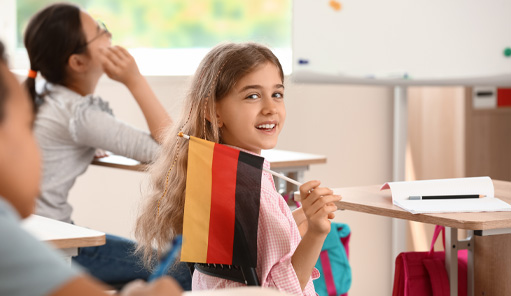
Michael Seuchter, Relocation & Immigration Director of AGS Relocation in Germany answers the most pressing questions new foreign employees have when faced with schooling in Germany and explains why getting the kids settled ASAP should matter to employers too.
Is school in Germany compulsory or may employees home-school?
Home schooling is not an option in Germany. All children between the ages of six and sixteen have Schulpflicht – school obligation. Your employees have three months after arriving in Germany to enrol their kids in school, depending on the state in which they live.
Usually, parents consider the school enrolment of their children a priority. “Once the children are settled, the parents usually feel more settled too,” says Michael.
Public, international or private school?
 The language(s) the employees’ children speak, the length of their stay in Germany and the children’s age determine which school is most suitable.
The language(s) the employees’ children speak, the length of their stay in Germany and the children’s age determine which school is most suitable.
Public schools are free of charge and offer excellent education, but the language of tuition is German. If children can speak German, it may be a good idea to choose a public school. Or if employees plan to spend a long time in Germany and want to give their children an immersive experience, then a public school that offers the children German language support is an avenue worth pursuing. Language integration classes for foreigners are widely available in German schools.
Young children generally acquire a language more easily than teenagers do, and it is not uncommon for non-German speakers to attend primary school. But children in middle or high school may have a hard time and experience academic fall-out if they try to study in a language they have not mastered yet.
If a child only speaks English or another mother tongue, the family is very mobile and/or the child is in late high school, an international school that offers multi-lingual instruction may be a better choice. The drawback is that international schools are concentrated in big cities and towns and can come with a hefty price tag. A six-month enrolment costs between €8 000 and €15 000 (2023).
Because German schooling is well regarded there are few private schools compared to some other countries.
Does the German school system use zoning?
Yes and no. In the first four years, children are placed in the school nearest their home. The reason for this is a practical one: children are encouraged to walk to school independently and the system makes sure they don’t have to walk for more than 15 to 20 minutes. From middle school, children can go to any school they like. Then they usually cycle to school or use public transport. Rarely do their parents drop them off.
How is the school system structured in Germany?
 Germany is a federation of 16 states and each state’s ministry of education and culture sets the curriculum for that state. As such, curriculums can vary from region to region. However, across Germany, children are usually streamed from grade 5 onwards.
Germany is a federation of 16 states and each state’s ministry of education and culture sets the curriculum for that state. As such, curriculums can vary from region to region. However, across Germany, children are usually streamed from grade 5 onwards.
Here is a quick summary of how it works:
Grundschule (Foundation phase): All children attend grades 1 to 4 (as well as 5 and 6 in certain states).
After the foundation phase, learners choose different paths, depending on aptitude, skills and interests.
Gymnasium: Academically strong children attend the Gymnasium, which prepares them for university entrance. Without a Gymnasium education, students cannot attend universities in Germany.
Mittelschule: Children in this stream leave school after Grade 9 and have the option to enter a trade or do another form of industrial work.
Realschule: Children in this stream leave school after Grade 10, after which they can enrol for vocational or professional training.
Gesamtschule: This type of school combines the tripartite system (Gymnasium, Mittelschule and Realschule) between years 5 and 10. After Grade 10, students can opt for the Gymnasium or leave school to pursue further training.
How do parents register their children for school?
As soon as the residential registration of a family is complete, school registration can take place. Parents must report to the Schulamt (local educational authority) at the council offices.
Where do expats typically send their kids to school?

Relocation & Immigration Director of AGS Relocation Germany
Michael says most expats who plan to stay in Germany for a long time or permanently, send their children to German public schools. Delegates on contract for three years or less frequently opt for international schooling if their company pays.
What is the biggest challenge for expat children in Germany?
Language is the most challenging factor for non-German speaking children. However, the school system is designed to support non-German speakers, Michael explains.
 When children enrol at a school, the school evaluates the children’s proficiency. A special guidance teacher works with the parents and arranges for the children to attend integration classes if necessary. These classes offer the children instruction in German as well as other subjects, such as mathematics.
When children enrol at a school, the school evaluates the children’s proficiency. A special guidance teacher works with the parents and arranges for the children to attend integration classes if necessary. These classes offer the children instruction in German as well as other subjects, such as mathematics.
If the children are in the foundation phase and their designated school does not offer integration classes, they may have to attend a school that offers integration for a few months before returning to their closest school.
After six months (often sooner, depending on their progress), children generally enter mainstream classes. Older children who wish to attend Gymnasium must pass a German proficiency test first.
Michael says most children adapt very quickly and cope well in the German classes once they have completed the integration classes. In some cases, however, children sacrifice one year to learn the language. “This year is not lost, though” he explains. “It is an excellent investment in the child’s integration and future studies in Germany.”
Why should getting the kids settled matter to you, the employer?
 After having taken the time to find the perfect candidate and going to the expense of moving them to Germany, you will naturally want to reap the benefit of their skills for as long as possible. This requires prioritising the family-unit as opposed to the individual employee.
After having taken the time to find the perfect candidate and going to the expense of moving them to Germany, you will naturally want to reap the benefit of their skills for as long as possible. This requires prioritising the family-unit as opposed to the individual employee.
Studies have repeatedly demonstrated that assignees with well-settled children enjoy a more gratifying home life, which translates into improved performance at work. Incorporating the children into the fabric of German society can also accelerate their parents’ integration by providing an avenue to make new friends and form a social circle.
Furthermore, focusing on the wellbeing of the family is just excellent for your brand, and can be a differentiating factor that makes you attractive to future candidates.
AGS Relocation’s school search service is designed for relocating parents who are unsure about the German education system. Our consultants recommend up to three schools per child based on their profile and a series of interviews. They also deliver valuable first-hand insights into each school’s advantages and disadvantages to help parents make informed decisions. This frees parents from having to research schools on their own, providing a stress-free settling-in process for both employees and their families.
To pave the way to a successful transition for your new non-German mom or dad, enquire about supporting them with school search by AGS Relocation.














